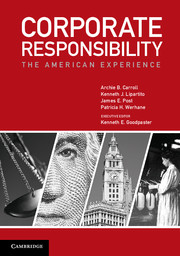Book contents
- Frontmatter
- Contents
- About the Authors
- Foreword
- Preface
- Introduction The Corporation in the Public Square
- Part I The Seeds of Corporate Responsibility
- Part II Corporate Responsibility Comes of Age
- Chapter 6 Corporate Legitimacy Affirmed (1945–1963)
- Chapter 7 A Revolution of Rising Expectations (1963–1973)
- Chapter 8 Managing Corporate Responsibility (1973–1981)
- Part III Taking Account of Corporate Responsibility
- Endnotes
- References
- List of Plates
- Index
- Plate section
Chapter 7 - A Revolution of Rising Expectations (1963–1973)
Published online by Cambridge University Press: 05 November 2012
- Frontmatter
- Contents
- About the Authors
- Foreword
- Preface
- Introduction The Corporation in the Public Square
- Part I The Seeds of Corporate Responsibility
- Part II Corporate Responsibility Comes of Age
- Chapter 6 Corporate Legitimacy Affirmed (1945–1963)
- Chapter 7 A Revolution of Rising Expectations (1963–1973)
- Chapter 8 Managing Corporate Responsibility (1973–1981)
- Part III Taking Account of Corporate Responsibility
- Endnotes
- References
- List of Plates
- Index
- Plate section
Summary
A growing social consciousness in the 1960s – which brought closer scrutiny of corporate behavior and greater challenges to corporate responsibility – presented a striking contrast to the general acceptance of corporate legitimacy of the 1950s. The 1950s was an interval of slow, but stable economic growth, material acquisitiveness, and social conservatism, but it was also a time of developing pluralism in the United States. As we saw in the previous chapter, with the discussions of thinkers and theorists such as Galbraith, Berle, and Drucker, serious discourse about corporate social responsibility began during this time. But the topic would come of age during the 1960s.
If the economy and government wartime policies were predominant factors influencing the parameters of corporate responsibility in the prior three decades, social movements were the key drivers of business-relevant social change in the 1960s and early 1970s. This chapter thus focuses, not on the economy, but on the story of social upheaval and the development of social movements in 1960s America, which began to change thinking about race and gender equality, and consumer and environmental protection, among other issues. As social awareness around these issues grew during these decades, corporations were increasingly called to adapt to changing social mores, and to answer for practices that discriminated against minorities or women, or constituted abuse of the environment or a breach of trust with consumers.
- Type
- Chapter
- Information
- Corporate ResponsibilityThe American Experience, pp. 230 - 263Publisher: Cambridge University PressPrint publication year: 2012

